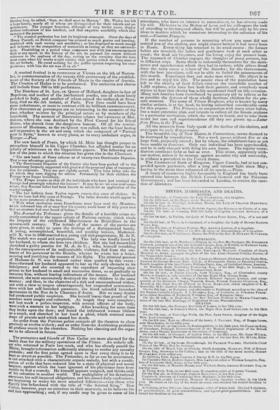A musical festival is to commence at Vienna on the
5th of Novem- ber, in commemoration of the twenty.fifth anniversary of the establish- ment of the Society of the Friends of Music in the empire of Austria. The Creation of Hadyn is to be performed. The orchestra and chorus will include from 700 to 800 performers.
The Dutchess of St. Lem ex- Queen of Holland, daughter-in-law of Napoleon, and mother of the Jmirbrained youths, one of whom lately perished in Italy, and another of whom caused the outbreak at Stras- burg, died on the 5th instant, at Paris. Few lives could have been more unfortunate, or more in contrast with its brilliant commencement. Few characters or personages are so interesting in the memoirs of the time, whether written by the principal actors or by members of the household. The memoir of Bourrienne relates her existence at Mal- maison, where she was destined by the First Consul for his friend Duroc, who shrunk from the dangerous honour. Of all the remini- scences of Hortense, as the ex-Queen was called, not the least lasting and impressive is the air and song which she composed of " Partant pour la Syrie," known to every piano, as to every ambulant organ, in Europe. —Post.
The new batch of Peers, by which M. Mole has thought proper to strengthen himself in his Upper Chamber, has afforded matter for an infinity of witticisms to the Opposition papers. The following are a few of the jests to which the creation has given rise in the Charivari.
"The new batch of Peers relieves us of twenty.two Doctrinaire Deputies. That is one advantage gained.
"The Doctrinaire Deputies of the Centre who have been packed off to the Luxembourg formerly supported with great zeal the propcsed plan of transporta- tion for criminals. They are now rightly served. They have fallen into the pit which they were digging for others. Fortunately for their children the Peerage is no longer hereditary.
"The Temps assures us that all the individuals who have just received the Peerage had pressingly solicited the honour! It may be so: we once read some- where, that Russian ladies had been known to solicit for an application of the marital cudgel. "The last bulletin from Toulon reports twenty-five cases of cholera. In Paris we have had fifty cases of Peerage. The latter disorder would appear to be the more inveterate of the two.
"With what exultation every Frenchman must have read the Moniteur, which informed him all at once that his country could boast of fifty great men that no creature had ever heard of before."
The Journal des Tribunaux gives the details of a horrible crime re- cently committed in the tipper sphere of Parisian society, which rivals the iniquity of the celebrated Marchioness de Brinvilliers in the seventeenth century. The initials of the names of the parties are alone given, in order to spare the feelings of a distinguished family. A young, accomplished, beautiful, and wealthy heiress, Mademoi- selle X. was in 1830 married to a young and rich proprietaire, M. de N. The match was equal and auspicious. The lady was fondly loved by her husband, to whom she bore two children. But she bad meanwhile cherished a guilty passion for M. A. de C. ; who, himself trembling for the consequences of its undisguisable violence, fled from the em. braces of his paramour to the Brazils, whence he wrote her a letter, avowing and justifying the reasons of his flight. The criminal passion of Madame de N. was inflamed rather than quelled by this event : thenceforward her husband appeared to her as the only obstacle to its indulgence ; and she resorted to the expedient of imparting slow poison to her husband in small and successive doses, so as gradually to consume him, without leaving indications of the means. Her husband removed, she next successively destroyed the two children in the same manner : and then, in the character of a rich and unencumbered widow, and with a view to reopen advantageously her suspended communica- tions with her self. banished paramour, she hired splendid furnished apartments in the Rue de la Chaussee d'Antin. But so many deaths had awakened public suspicion. She herself learnt that proofs of her murders were sought and collected. At length they were complete; and last week a police-inspector, with several officers of the body, went with a warrant to her lodgings. After knocking for some time they broke upen the door; and found the infatuated woman lifeless on a couch, and clenched in her hand a phial, which retained some drops of prussic acid which caused her death.
An order from the Parisian police compels all the theatres to close precisely at twelve o'clock ; and an order from the Archbishop prohibits all profane music in the churches. Nothing but chanting and the organ are to be allowed in future.


























 Previous page
Previous page